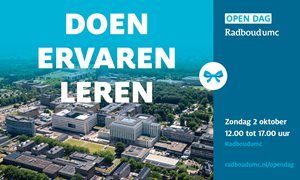
On 17 November 2020, more than 70 colleagues discussed 'Online recruitment of study participants’ in a webinar organized by RIHS. This webinar was the first chapter of the RIHS digital health research series. In this session, Marleen van Gelder (PRIDE study), Maaike Gerritse (DECISION study) and Janet den Hollander (Healthy brain study) shared their experiences with online recruitment of study participants. Jolt Roukema shared the view of the Medical-Ethical Review Board Arnhem-Nijmegen on online recruitment. The webinar was hosted by Tom van de Belt. If you missed it: the session is available online.
Disappointing participation rates were one of the main reasons to switch to the recruitment of study participants via social media. All speakers favoured this enrichment of their recruitment strategy, since it was (very) successful in improving the inclusion rates for their studies. For example, the Facebook ads in the PRIDE study resulted in new participants on a daily basis, which is more than via offline recruitment strategies. Facebook ads in the DECISION study also delivered new study participants, although the inclusion rate remained comparable to normal inclusion strategies.
One of the greatest benefits of online recruitment is the ability to reach out to your specific target population, starting by choosing the right media platform. All speakers in this Webinar used Facebook, as their target population was most active on this media platform. Interestingly, the characteristics of the participants they recruited via social media differed from ‘classically-recruited’ participants. Demographics such as age, body mass index, and educational level were different. By this, recruitment via social media has the potential to improve the external validity of your study!
As with everything, online recruitment via social media has some potential disadvantages. For example, online advertisements can be costly. In the presented studies, the costs differed from €10 to €112 per included participant. The costs can be reduced by more attractive advertisements (“content is king”), targeting the ads to a specific population, use study participants as promotors, simplifying your recruitment methods, and be clear about what is in it for them (incentives). Another potential disadvantage is that participants recruited via social media may have a lower commitment to your study, which could lead to higher loss to follow-up.
The Medical-Ethical Review Board (Dutch: CMO) Arnhem-Nijmegen is enthusiastic about all new methods aimed at increasing participation rates, including online recruitment of study participants. Be aware that for WMO research, you will always need CMO approval for all online content. Besides, keep in mind that your advertisements cannot be too promotional and they do not replace the subject information sheet (Dutch: PIF). For non-WMO research, the most important requirement is that you apply to the General Data Protection Regulation (Dutch: AVG). The privacy officer of the hospital can help you if you have any questions about this.
Written by Tessa Schoot and Yannick de Korte
RIHS PhD Council
Related news items

Joint research in regional hospitals New research projects from promotion fund
22 November 2022Four research projects have been honored in the promotion fund of the Radboudumc and four regional hospitals. The research projects, which are a collaboration between CWZ, Jeroen Bosch Hospital, Rijnstate, Sint Maartenskliniek and the Radboudumc will receive a contribution of 240,000 euros.
go to page
New Radboudumc PhD thesis guidelines & Rules composition Manuscript Committee
8 November 2022The new PhD guidelines replace the current 2019 guidelines and are applicable to anyone pursuing a doctoral degree within the medical faculty (including PhD candidates that are currently participating in the Donders Graduate school). The guidelines are now available.
go to page
L’Oréal-Unesco For Women in Science grants now open to researchers in Life Sciences and STEM disciplines
8 November 2022The eleventh call for applications of the Dutch L’Oréal-Unesco For Women in Science fellowships opens on 16 January 2023. But this year, it’s a little different: next to researchers in Life Sciences, women working in the STEM disciplines can also apply.
go to page
Do you want to participate in producing a short film about your PhD research?
27 September 2022In the BMS master course 'Moving Science-using film in science communication' master students will have to make a short film on a scientific subject. And what better subject than a PhD project? Sign up here!
go to page
Take a special look inside Radboudumc on 2 October Open Day for young and old
12 September 2022On Saturday 1 and Sunday 2 October, the Radboud university medical center, Radboud University and the HAN are participating in the 'Weekend van de Wetenschap'. At all locations there are fun and interesting programs for young and old.
go to page
